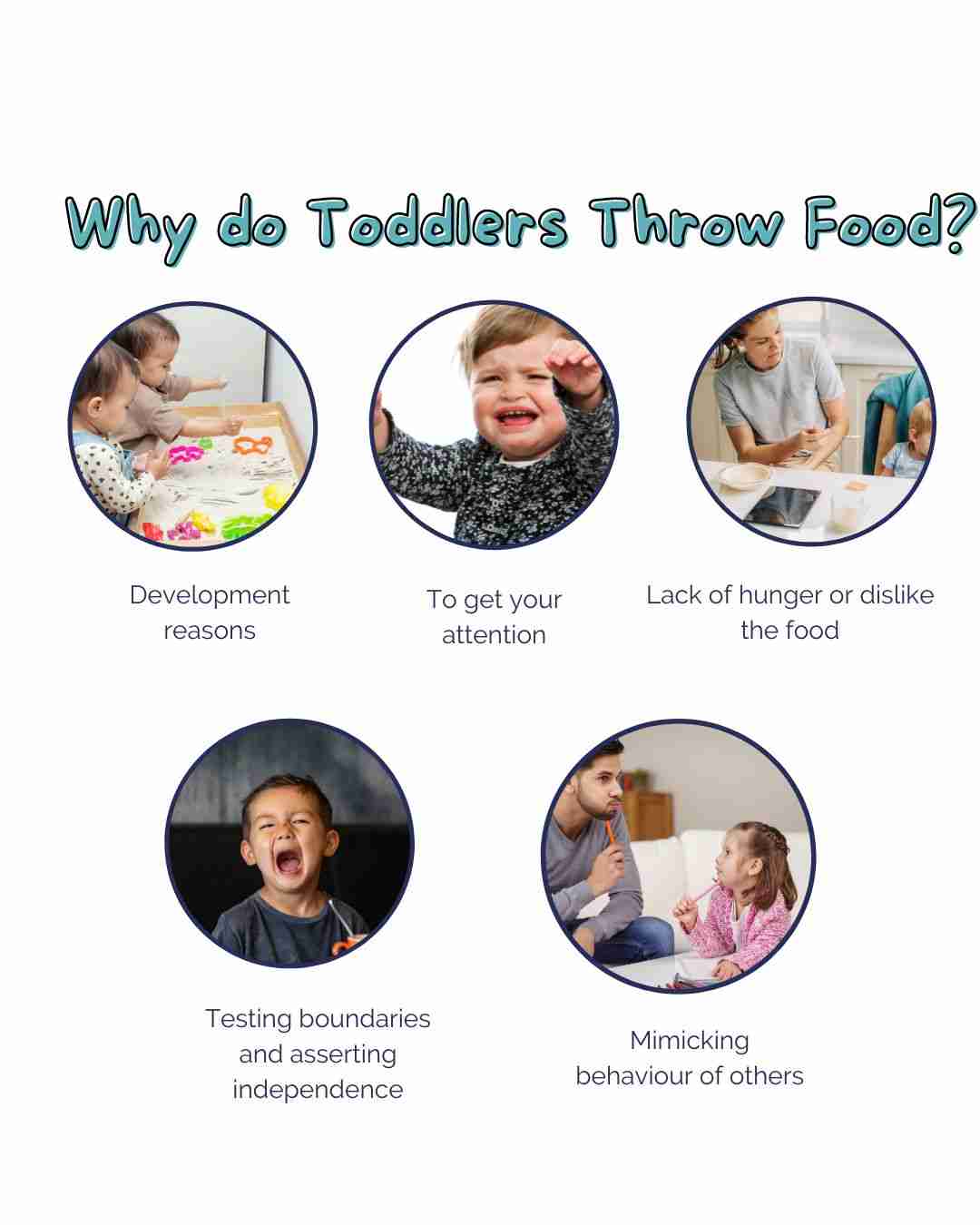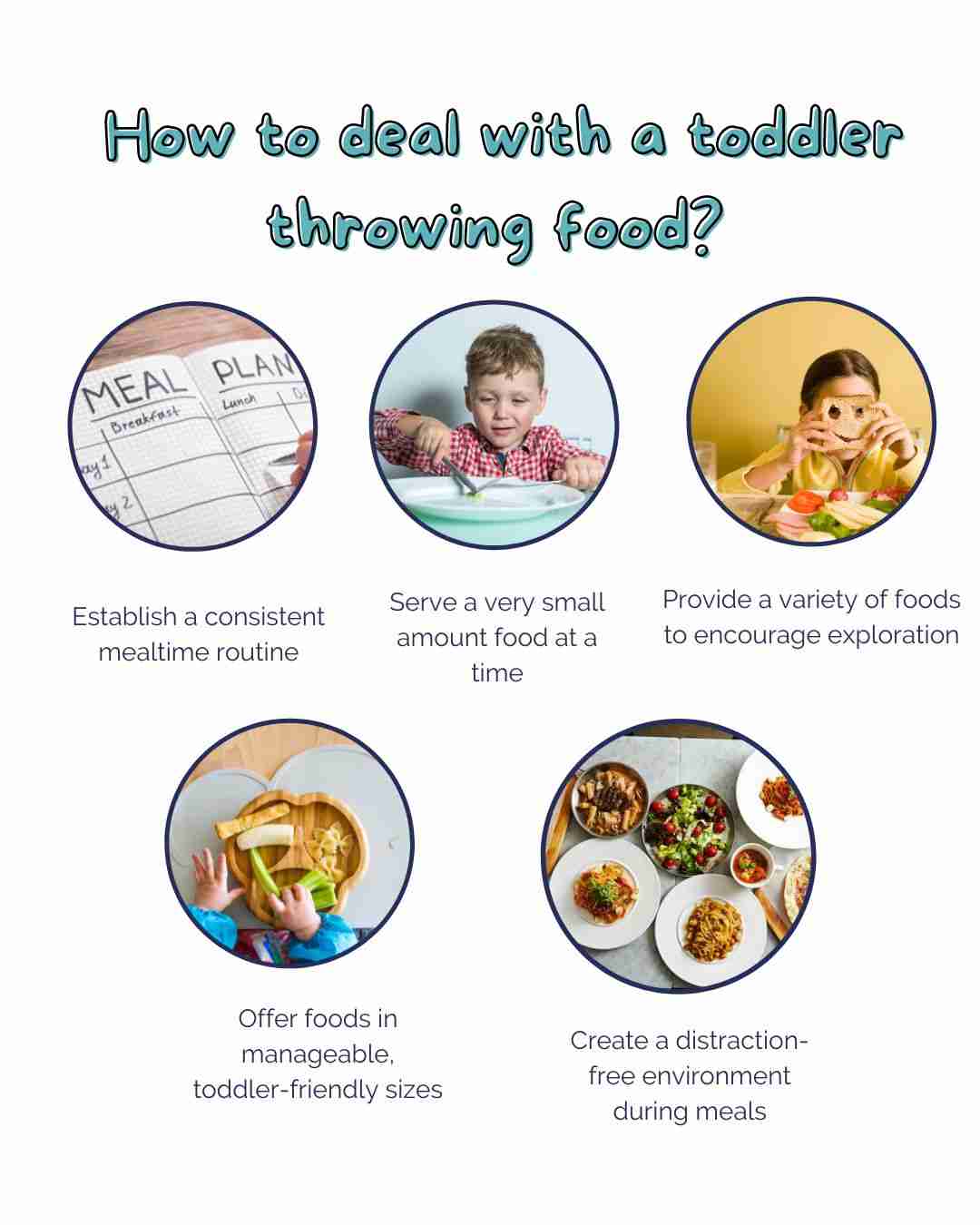As a paediatric dietitian and a parent, I know how frustrating it is when your toddler is throwing food.
It’s a scene familiar to many, you prepared meal, beautifully presented (on a plate a least) to your child, only to be met with flying peas and flung spoonfuls. The sight of food being throw on the floor can trigger frustration and leave you feeling overwhelmed.
It used to drive me mad too when my little girl did it.
However, it’s important to recognise that toddler food throwing is a phase that many children go through on their developmental journey. The reasons behind toddler food throwing are linked to developmental milestones, emotional needs, and emerging independence.
Toddlers are curious explorers, eager to assert their autonomy in their lives, including mealtime. This behaviour can serve as a form of communication, a means of testing boundaries, or simply a way for toddlers to engage with their surroundings.
In this blog we share practical strategies aimed at easing mealtime stress associated with throwing food.
Why Do Toddlers Throw Food?
Developmental Reasons
Toddlers are like tiny scientists, constantly testing and exploring their world—including their food. This is why food play is so important you can read more about it in this blog post.
Food throwing can be their way of experimenting with cause and effect, as they learn what happens when they drop or toss items. It’s all part of their natural curiosity and desire to understand how things work. Although as a parent it can still be frustrating.
Attention-seeking behaviour
For some toddlers, food throwing is a way to grab attention. They may enjoy the reaction they get from parent when food goes flying or simply crave interaction during mealtime. By tossing food, they’re seeking engagement and connection with those around them.
Lack of hunger or dislike for the food
At times, food throwing can signal that a toddler is not hungry or doesn’t enjoy the food being offered. Rather than eat something they don’t like, it is easy to just throw it. It’s their way of communicating their preferences and asserting some control over their meals.
Testing boundaries and asserting independence
Toddlers are discovering their own sense of autonomy, and mealtime is no exception. Food throwing can be a way for them to assert their independence and test the limits set by parent.
But it can mean a lot of mess for you to clear up. I found getting a shower curtain or big mat on the floor made clearing up the mess much easier.
Mimicking behaviour of others
Toddlers are watching the world around them, often imitating behaviours they see in others. If they witness food throwing, whether from siblings, peers, or even on TV, they may mimic this behaviour themselves.
It’s a form of social learning as they try to make sense of the actions and reactions of those around them.

How to deal with a toddler throwing food?
1. Establish a consistent mealtime routine
Consistency is key when it comes to managing toddler behaviour, including food throwing. Set regular meal and snack times to create structure and predictability in your child’s day.
As a feeding therapist this is a key as they know what to expect, they’re less likely to act out or engage in disruptive behaviours like food throwing.
2. Serve a very small amount food at a time
Avoid overwhelming your toddler with large portions of food. Offer smaller, manageable portions that match their age and appetite.
This not only reduces the likelihood of food throwing but also encourages them to learn about their hunger and fullness cues. Plus they can always have more food.
3. Provide a variety of foods to encourage exploration
Introduce a wide range of foods to your toddler’s diet to encourage curiosity and exploration. Include fruits, vegetables, carbohydrates, proteins, and dairy products or dairy alternatives to provide a balanced and nutritious diet. Exposure to new foods is key to helping with fussy eating too.
4. Offer foods in manageable, toddler-friendly sizes
Make mealtime easier for your toddler by serving foods in sizes and shapes that are easy for them to handle. Finger foods, bite-sized pieces, and foods with diverse textures can make eating a more enjoyable and less frustrating experience for your toddler.
5. Remove distractions during meals
Minimise distractions during meals by turning off screens, eliminating noisy toys, and creating a calm atmosphere. This allows your toddler to focus on eating and reduces the likelihood of food throwing as they become more engaged in the mealtime experience.

6. Sit with your toddler during meals
Children learn by example, so be a positive role model when it comes to eating habits. Sit down with your toddler during meals and serve family style meals.
7. Encourage self-feeding and independence:
Try to let your toddler to feed themselves and make choices about their food. It all about the Division on Responsibility developed by Ellyn Satter. You are responsible for the what, when and where of feeding and let your child determine how much and whether to eat of what you provide. (1)
This fosters a sense of autonomy and reduces the likelihood of food throwing as your child feels more in control of their eating experience.
8. Stay patient and understanding during mealtimes:
Above all, remain patient and understanding during mealtimes, even when faced with food throwing or other challenging behaviours. Remember that toddlers are still learning and developing, and mealtime can be a stressful experience for them as they navigate new tastes and textures.
Respond to food throwing calmly and redirect their behaviour with gentle guidance and encouragement. With time and patience, mealtime can become a more enjoyable and peaceful experience for both you and your toddler.
9. Involve toddlers in meal preparation and cleanup:
Engage your toddler in the mealtime process by involving them in meal preparation and cleanup activities. Let them help wash vegetables or stir ingredients.
By participating in these tasks, they develop a sense of ownership and responsibility for the meal, reducing the likelihood of food throwing as they feel more involved in the process.
10. Offer choices for your toddler
Give your toddler some control over their meals by offering choices within limits. For example, let them choose between two healthy snack options or decide which vegetable to include with dinner.
By empowering them with choices, you encourage independence and reduce the need for food throwing as they feel more in control of their mealtime experience.
In conclusion, if food throwing persists or worsens despite your best efforts to manage it and your child is not eating seek professional advice from a paediatric dietitian. As a paediatric dietitian and feeding therapist I can offer guidance, support, and personalised strategies to address your child’s specific needs and challenges. For more help check out my 1.1 consultations.
Written by Emma Shafqat BSc RD, Dietitian and Feeding Therapist.

